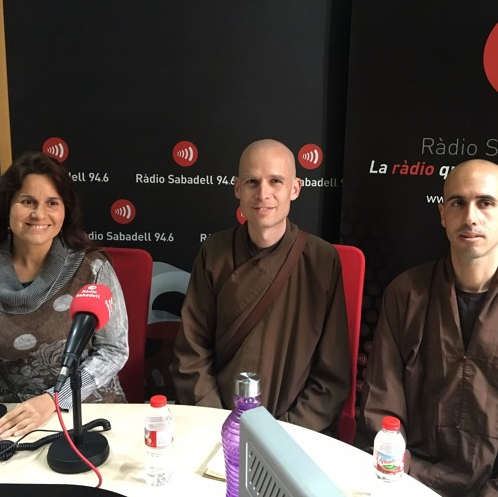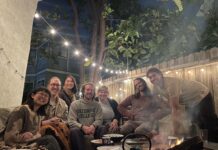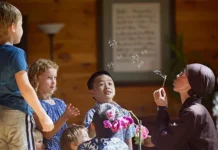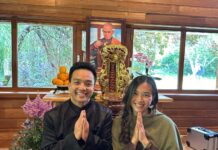 A few days before the Wake Up Schools retreat took place at the University of Barcelona from the 9th to the 11th of May, 2016, Radio Sababell interviewed two monastics from Plum Village and a lay friend.
A few days before the Wake Up Schools retreat took place at the University of Barcelona from the 9th to the 11th of May, 2016, Radio Sababell interviewed two monastics from Plum Village and a lay friend.
Radio Presenter: Good morning. We have Pilar Aguilera, Brother Phap Luu and Brother Hy Ma from Plum Village. Welcome to the program of Radio Sabadell!
Phap Luu, how did the Wake Up Schools program begin? Why are monastics in charge of a children’s program?
Phap Luu: Our teacher (Zen Master Thich Nhat Hanh, or Thay) planted the seeds for Wake Up Schools in the 1960s in Vietnam. His program, called the School of Youth for Social Service, trained groups of young people (about 10,000 of them) to help out in the countryside, going to villages to provide farming families with medicine, to open medical clinics, to train people in basic sanitation and hygiene, and to teach the children. Thay trained the young volunteers with the practice of mindful breathing, so they could learn how to calm down their mind and body and to live happily in the present moment. When the volunteers came to the villages, they saw that there were no electricity or schools, and no social services. No one could play with the children or be present for them. The children would play in the streets while the parents worked in the fields.
The parents in these farming families were quite grateful to these young volunteers for being with their children while they were busy in the fields growing rice. The volunteers also provided a cup of soy milk to each child every day. They came without money, only with goodwill. Eventually one family would offer their home to be used as a schoolhouse. After a few months, the people in the town, seeing the goodwill of the volunteers, would help them to build a school. In this way our teacher really already started Wake Up Schools 50 years ago. He also founded the first university with a Western curriculum in Saigon, named Van Hanh University, with the intention of teaching in a way that the monks and nuns could get in touch with what was happening with humanity in general, how they could learn to be human beings with a deeper understanding for one another, in touch with their true nature.
This university was there like this until 1975, but it no longer follows this kind of program. Thay, was exiled in France when he called for peace in the West before the end of the war in Vietnam, but he worked to continue with this path in Europe. He has taught this kind of engaged practice for more than 50 years, developing a language that speaks to westerners.
We can benefit and learn from his path. Now we want to find a way to change the direction of education, to make it more human-centred. How can we live with more peace and understanding in our body and mind? How can we learn how to handle our strong emotions? We see this as the basis of all education. If we ourselves as teachers don’t know how to handle strong emotions with mindful breathing, coming back to the present moment, then how can we expect to help others do so? Teachers must embody the practice themselves first.
Education is not just about receiving information. It’s not just about understanding technology, but, rather, it is learning how to be a human being. This is the basis of Wake Up Schools.
Radio Presenter: Should this kind of learning be an additional course in the university curriculum, or should it be incorporated throughout the curriculum?
Phap Luu: Many professors are surprised to find out that no extra time needs to be added to their course. Our presence, our way of being, is how we teach others to be present. In our retreats, we help many teachers learn how to incorporate mindfulness practice into their daily lives. We always start with the teacher’s own practice, not by just teaching them techniques of how to teach children. The teachers usually come looking for techniques. They want another certificate, but when they come to a Wake Up Schools retreat, they are a little surprised to find that their own transformation is what is most important. They learn how to stop and look deeply into their own body and mind.
In life we are always running towards the future, or regretting things done in the past. We are lost in our thoughts. With mindfulness practice we learn how to stop running to be fully present in the here and now with our breathing. The breath is always there for us. When I breathe in, I’m aware that I’m breathing in. Breathing out, I’m aware that I’m breathing out. We follow our breathing with all our attention. When our attention shifts to something else, like thoughts about the past or the future, we can smile to our thoughts with love, not punishing ourselves because we lost the focus on our breath. With love, you bring your attention back to your breath and your concentration increases, as well as your capacity to keep from being dragged down by the projects and worries of daily life. We can come back to the present moment like this in only two to three seconds. We can do this not only for ourselves, but also to help our students and others to be more present. This is the biggest gift we can give to ourselves and to our loved ones.
Radio Presenter: When I listen to this I say to myself, “I’m interested. This is what I need.” We don’t have to go to Vietnam, thankfully, to participate in this program. From Friday to Monday, this program will take place here. Pilar Aguilera, how did you organise it and what does this retreat entail?
Pilar: The retreat is organised together with the University of Barcelona and the Plum Village community. We had the opportunity to bring Thich Nhat Hanh here in 2014. A lot of teachers from around the world came to the retreat to see him then, and now we have an opportunity for Plum Village to come back here so that teachers in Spain may again benefit from these teachings. These retreats are there to nourish our mindfulness practice.
Like Brother Phap Luu said, in these retreats we learn to live with more peace, and to nourish the seeds of well-being and kindness in ourselves and others. As one’s practice develops, we are able to spread these seeds of kindness in our careers, in both our personal and professional lives. Mindfulness helps us to be more present, to be able to live in a more peaceful way, and to be able to realise our true essence in life. When we are at peace, whatever we do with our family, our neighbours, or our work, we find we have the ability to communicate with ourselves and others, to be more aware of the wonders of the present moment, right here and now. People are happier, and they learn how to live with more joy in the present moment.
Radio Presenter: And this can be learned in the university. This is all revolutionary, no? Little by little, the conventional education system begins to be more open-minded to this new school of thought, these new ways of living as human beings that we have forgotten : cultivating attention and compassion, especially with respect to children.
Pilar: Yes, we feel very grateful to the Institute of Educational Sciences at the University of Barcelona for helping us to organise this Wake Up School retreat. Every day mindfulness becomes more relevant to the world of education. Scientists have done research in the United States, England, and Spain showing that there is a clear impact of mindfulness training on children and teachers in schools. It’s revolutionary what mindfulness can do in the world of education. The universities also know that, and this is why the University of Barcelona is more committed every day to the program of Wake Up Schools, to support all the teachers in Catalonia and Spain so they may bring these teachings into today’s schools.
Radio Presenter: In addition to the Wake Up Schools retreat, you’ve already started to establish this training concretely in schools, no? How do we continue this experience after a Wake Up Schools retreat in an educational centre?
Pilar: Yes. Since 2014 we have been conducting Wake Up Schools training at levels 1 and 2 where teachers from all over Spain can come and participate. It’s an ongoing curriculum from the Department of Education at the university. As you know, the teachers who come to these courses receive more than just training. When they enrol in the course, they think there will be a beginning and an end to the training, but when they touch what is the essence of mindfulness they realise their life has been transformed. This course has helped them to touch the miracle of mindfulness, the miracle of presence.
It’s like a gift they offer themselves. Many teachers thank me and the Plum Village community, because this program allows them to return to reconcile with humanity, with their truth. It can spread to their children and their teenagers. It’s wonderful to be able to live this essence of mindfulness and integrate it more into your personal life.
Radio Presenter: I have another question for Phap Luu. Maybe there are people who are listening to us who are a little afraid, or are turned off, because they think this is a religious program, or a program to change their children’s faith. For those who think that way, how would you respond?
Phap Luu: It seems the word “religion” is something that brings with it a lot of history in Europe that has to do with the Catholic church and the state. In Asia, things evolved in a distinct way. The practice of mindfulness doesn’t have much to do with religion, but rather with how to live life. I wouldn’t say that Buddhism is a religion. It’s more a kind of applied psychology. It’s the practice of getting in touch with the present moment and letting go of any ideas or points of view. That is the basis of Buddhism—learning to let go of all ideas, even Buddhist ones. It’s the practice of allowing ourselves to be open to the world in the present moment.
This is the basic practice the Buddha proposed. He didn’t want to create a religion; he wanted to help people suffer less. So we are doing the same with our life and with the people around us. If there’s something that makes us suffer, we have to ask ourselves: what is it that brings about this suffering?
Many young people commit suicide every day because they don’t know how to deal with their strong emotions. The pressure of exams, of social life, of having a job, of living in a world with advertising around us wanting to sell us things—they don’t know how to manage all of this pressure. Now in school we don’t give them a way to understand why they are suffering. It seems to be an error on our part in the education system. It’s interesting that so many scientists are now interested in this practice that comes from the Buddhist tradition. They see it’s a tradition that has a scientific method of direct first-person experimentation, where we can see clearly the fruits of our practice, and they don’t have to just blindly believe what the Buddha says. They can experience it for themselves.
Any person can put this into practice in their life and see how it goes. When we talk about faith in mindfulness practice, this faith comes from our own experience. It’s the same with scientists. They have faith in science, which is based on results and concrete experience. That’s why there’s a loving and very mutual relationship between the scientific world and the Buddhist tradition; we are always learning from each other.
In our community we have, for example, many Christians who are very devoted to their faith, and they find no conflict between Christianity and Buddhism. The former is more properly a religion, and the latter has more to do with their everyday practice of mindful breathing: they complement each other. There are many Christians who say they can go deeper on their spiritual path with mindfulness. So I don’t think there is any conflict, and schools and institutions are learning about this. They are more open-minded now to this vision.
Radio Presenter: Another member of the community who’s accompanying us from Plum Village is from Castelldefels, Catalonia, Spain. His name is Brother Hy Ma. Good morning, and welcome!
Brother Hy Ma: Good morning.
Radio Presenter: You came in contact with Plum Village four years ago and you’ve been living with the community for the past three years. How has your path developed, and what did you do previously? How did you get to know Plum Village and how has it radically transformed your life?
Brother Hy Ma: Well, I always had the worry within me that I wasn’t going to find true happiness in objects, people, and all kinds of desires. For me, it was a strong awakening to travel after working for seven years in construction. I had the opportunity to leave the normal world, to stop working and thinking about the future, about buying a car and a house, or about finding a partner. Traveling helped me to open doors and maybe find something more to make myself happy, not something external. Traveling helped me to open my mind.
Before encountering the Plum Village tradition, I practiced some meditation and I realised that it helped me to open these doors: to find this something that doesn’t require me to depend on external things for happiness, that helps me to find happiness within. There is also a kind of happiness that comes from external things, but it always seems to disappear quickly, no? So this internal happiness gives me the strength to plant seeds within me to water this happiness, which is not just an idea. This happiness depends on how I nourish it. Thanks to the mindfulness practice, I learned how to cultivate this happiness inside me. When there are external things occurring that take me away from the present moment and make me think that happiness is in the past or is somewhere in the future, watering the conditions of happiness in the here and now gives me an interior strength to generate more of this happiness. I don’t know how to say it exactly. We don’t have to depend on anything outside of ourselves.
Radio Presenter: You spent four years in Plum Village. Has there been a time you’ve thought of another path, or that you’ve missed something? Or do you feel that this is your definite path for life?
Brother Hy Ma: Well, it depends on each one of us, but I have always been a little insecure in my life. I am not clear if I want to continue being a monastic for life, or if I want to return to society as a lay friend, find work, or whatever. I have thought about it, but when I think more about this, I’m again watering seeds of expectations and desire that I already have within me. When I discover this clarity, I go, “Oh, I’m thinking more about the future. Why?” I have done this many times, so if I do this again I end up thinking again that happiness is in the future, which takes me away from the present moment, here and now.
I see that my path is mindfulness, and I know how to nourish happiness within me. Even though I have insecurity about what I’ll do in the future, I don’t lose myself in my desires and expectations, which is the normal thing people do. Everyone does it. Yes, there are some people who are clear that they want to be a monastic for their whole life, or they are clear that they want a life partner, but no one knows what will happen in the future. All of these are expectations about the future. They are not happening at the moment, and everything can change from night to morning.
Radio Presenter: We have four minutes left. I was wondering if you could share a little meditation practice that people could learn.
Phap Luu: Well, in whatever situation you find yourself now—in a car, the kitchen—wherever you are listening to this program—you can come back to yourself and completely pay attention to your breathing.
Breathing in, I know I’m breathing in.
Breathing out, I know I’m breathing out.
In, out.
(sound of the bell)
I follow my breathing with all my attention, breathing in and breathing out.
I let go of all the thoughts of the future and the past.
Breathing in, I am aware of my whole body.
Breathing out, I relax my whole body, letting go of any tension.
(sound of the bell)
I’m aware of the tension in my body that I’ve accumulated over the years, from my thoughts and worries.
I’m aware of them and I breathe freely.
I let go of any tension.
Breathing in, I touch within myself the joy of being alive. It’s a miracle to be alive on such a beautiful planet.
Breathing out, I smile to life.
Breathing in, I’m aware of the wonders of being alive.
Breathing out, I smile.
(sound of the bell)
Radio Presenter: Thank you very much, Phap Luu, Brother Hy Ma, Pilar Aguilera. Have a wonderful day!
Phap Luu, Brother Hy Ma, and Pilar: Thank you.
This interview was originally conducted in Spanish on Radio Sabadell.
Click here to visit Wake Up Schools website and upcoming retreats.

















